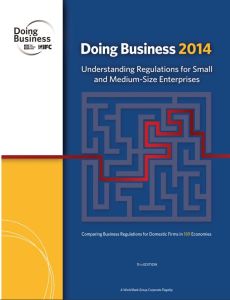Join getAbstract to access the summary!

Join getAbstract to access the summary!
The World Bank
Doing Business 2014
Understanding Regulations for Small and Medium-Size Enterprises
World Bank, 2013
What's inside?
A bird’s-eye view of how to start, run and fold a business in 189 economies around the world.
Recommendation
In this 11th edition of its annual review, the World Bank assesses the rules and regulations for starting, running and shutting down a business in 189 of the world’s economies. Researchers collected, examined and compared data on 11 aspects of small and medium-sized businesses around the world to gauge the level, scope and effectiveness of regulation. They sought to determine what guidelines contribute to a flourishing business environment and where reforms could improve an economy. The report is a treasure trove of data and statistics accompanied by a clear and concise narrative that is valuable to users at all levels of expertise – from those attempting first-time start-ups to seasoned professionals working on serial enterprises. Worldwide, small and medium-sized businesses drive economic growth, so getAbstract recommends this comprehensive, significant overview of business regulation to policy makers, business executives, global entrepreneurs, and owners of businesses great and small.
Summary
About the Author
Owned by its member countries, the World Bank is a global financial institution that provides funding for capital investments in the developing world.






















Comment on this summary